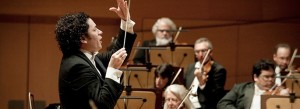On a cloudy Sunday afternoon, Gustavo Dudamel conducted the LA Phil in one work, the monumental Symphony No. 9 by Gustav Mahler.
Mahler finished his last symphony in April 1910, one year before he died of heart disease, and there is much in the symphony that suggests that Mahler knew of his impending death, especially the last movement, an adagio that reminds one of the final movement of Tchaikovsky’s last symphony, which he finished just a few months before his death. Not only that, but the beginning of the adagio is reminiscent of the beginning of the third, and last, movement of Bruckner’s Ninth (he died before completing the fourth movement) and final symphony. Bruckner called the third movement “Farewell to life.”
Thus, death was clearly on Mahler’s mind in his ninth symphony, more so than it had been throughout a life in which many of his compositions dealt in one way or another with death. Even if one did not know that Mahler was dealing with his imminent death, parts of the music certainly suggest it. This is especially evident in the last notes of the fourth movement which fade to a whisper and then disappear. However, at about one hour and a half long, the symphony also contains other parts that hint at joy and even rebirth.
In his relatively brief time, not only as a conductor, but in life, Dudamel has already become a mature Mahler interpreter. The Ninth, even more so than Mahler’s other symphonies, requires a depth of musical understanding usually reserved for much older and seasoned conductors who, themselves, are far closer to the end than Dudamel is.
This performance of the Ninth was even more poignant as longtime LA Phil violinist Barry Socher had died, prompting Dudamel to make the announcement on stage before performing Mahler’s ode to death. Dudamel said he would miss looking at the first violin section and seeing “Johannes Brahms” or “Santa Claus” (Socher had long white hair and a long white beard — to this reviewer, he looked more like Karl Marx). Clearly, Dudamel and the members of the orchestra were saddened to lose one of their own (actually, they lost two within the last month with the death of longtime bassist Frederick Tinsley in September).
The performance was breathtaking. The orchestra, perhaps playing for their lost friend and colleague, played with a singular purpose, and both they and Dudamel were in one of those rare zones where the music was elevated beyond the notes on the page. In the last movement, the strings were as lush as I’ve ever heard them; indeed the string-heavy movement was reminiscent of the adagio of Tchaikovsky’s Pathetique.
After the final notes died out, Dudamel held his hands up and the audience remained quiet for longer than I’ve ever heard in Disney Hall or, for that matter, any hall. Given the acoustics in Disney Hall, a dropped pin could have literally been heard. It would not have been inappropriate for Dudamel to have simply led the orchestra offstage without any applause. Nevertheless, the audience did applaud, and, amazingly, very few left the hall immediately. They realized that they had just witnessed an extraordinary performance of an extraordinary symphony.
—Henry Schlinger, Culture Spot LA
For information about upcoming concerts, visit www.laphil.com.






